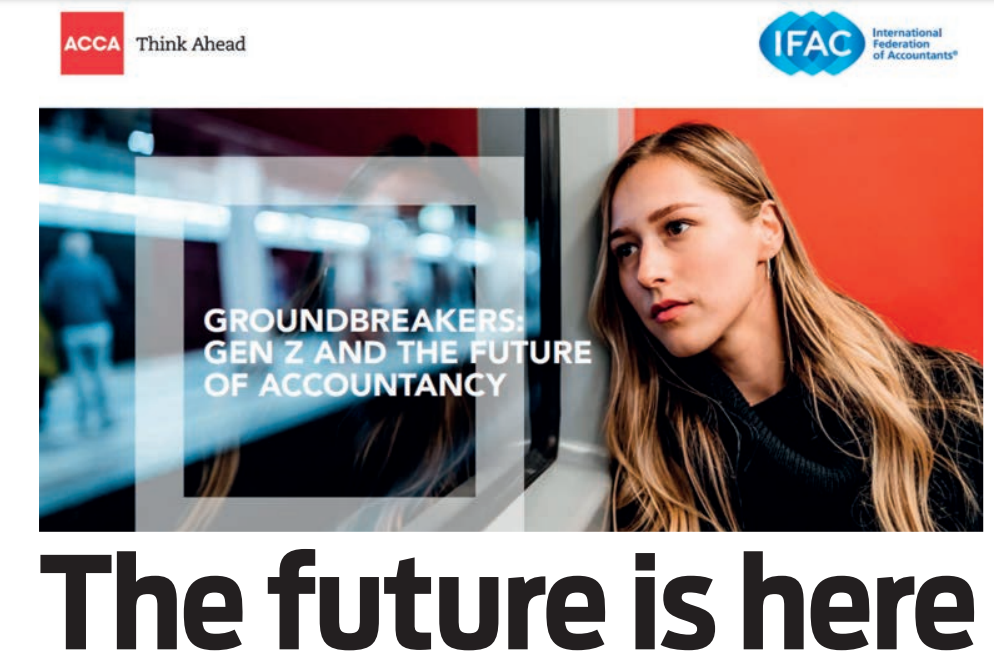June 2021.
Young people in the accountancy profession have spoken, writes Jamie Lyon, and businesses would do well to take heed of Generation Z’s advice.
We often hear the phrase ‘wisdom comes with age’, but I find myself learning a lot from younger people on a daily basis – whether it’s helping with technology or merely offering a different perspective. Essentially, we can all learn from each other.
The cohorts succeeding the Millennials are now entering the workforce against the backdrop of an extraordinary 2020 and start to 2021. And ACCA and IFAC’s (the International Federation of Accountants) latest report – called ‘Groundbreakers: Gen Z and the future of accountancy’ – sees the views expressed of 9,000 18-25 year old aspiring accountants and finds some humbling opinions.
The research reveals that while respondents are broadly convinced businesses have a positive impact on wider society (69%), they also believe there is significant room for improvement from business leaders.
They believe businesses continue to prioritise the maximisation of returns to investors (66%) over taking care of customers (53%) and employees (47%). They are also less convinced that business leaders have integrity and do what they say (41%) and fewer of them believe businesses are currently pulling their weight in fight against climate change (39%).
Broadly they think accountancy is an attractive career – providing long term prospects and portability with access to jobs that span internationally and across industries – but it is clear this generation questions business’ focus.
Other key findings reveal:
• Generation Z is entering a disrupted workplace. At the heart of their career aspirations is the economic and social context they have witnessed as they come of age, coupled with an unprecedented last 12 months, and they have concerns around job opportunities and security, wellbeing and mental health.
• Companies that provide opportunities to acquire skills and a good work life balance fare better. Job insecurity may be this generation’s biggest concern, but that does not mean they are intent on accepting any job to play safe. The data suggests they attack these insecurities with quite a different strategy, seeking organisations that can provide them with continuous skills and development.
• Businesses also need to harness Gen Z’s ambitious nature. For Generation Z, it is a workplace that is fluid, transitional and where opportunities must be grabbed. Many expect promotion in their next move and a significant proportion are eyeing an external move. It seems they are quite happy to take their talents elsewhere.
• This generation raised on digital and social media is comfortable with technology and see the future world of work connected and transformed by it, mostly for good. Yet they are a generation that has been hard hit economically over the last 12 months and as they come of age, they have witnessed technology being adopted at scale and replacing jobs. So despite being digital natives, some have concerns over the impact of digital on their own job opportunities.
• The data suggests there are more opportunities for the profession to communicate the attractiveness of accountancy better and how accountants can make a real difference to wider societal issues, such as climate change.
How do companies view Gen Z?
Employers cite Gen Z as super smart, creative individuals who are natural disruptors in the workplace and who challenge conventional ways of undertaking work activities.
They also see their connectedness, their technology skills and understand that Gen Z want their voice to be heard in the workplace.
Businesses do value the importance of listening to younger people. As the younger generation gain essential exposure to mentors and individuals with more experience in the workplace, this also affords benefits to leaders personally in terms of learning and looking at business issues from a different perspective
Also, employers cite the importance of articulating what the organisation stands for, its purpose, its impact on wider society, and its broader stance on issues such as diversity and inclusivity when attracting Generation Z to the organisation.
The report offers businesses ten tips to encourage and harness Gen Z’s potential:
1: Tap into Gen Z’s digital mastery.
2: Think ‘intrapreneurship’.
3: Use social to recruit and recognise the power of peers.
4: Be authentic and listen to Gen Z.
5: Focus on well-being.
6: Align organisation purpose with individual development needs.
7: Create collaboration opportunities across the workforce.
8: Reward on outcomes not inputs.
9: Give continual feedback.
10: Rethink learning: make it short and visual.
This age group is smart, connected, ambitious yet realistic. What we see from this research is young people at the outset of their accountancy careers who are keen to play their part in economic renewal.
They will bring their talents and aspirations into the workplace and potentially transform the future of accountancy for the modern world.
• Jamie Lyon, report author and head of business management, ACCA




